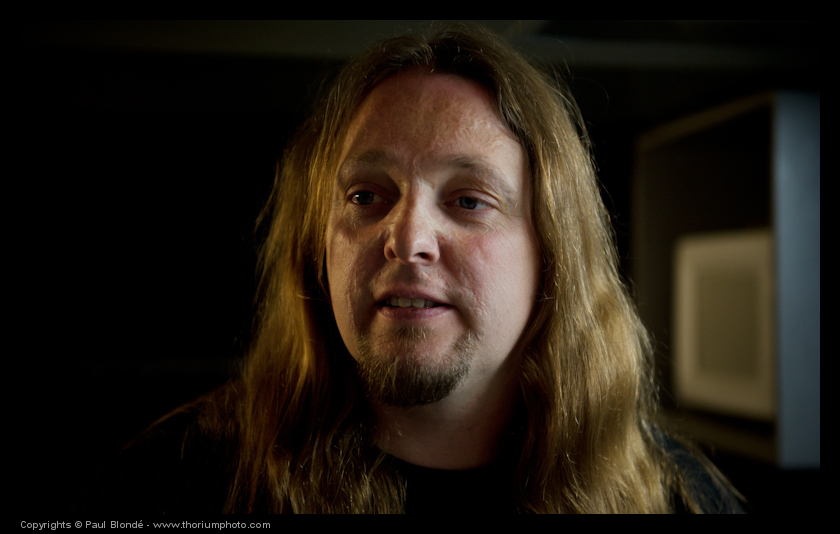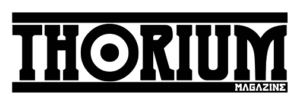Interview : Gunnar Thomsen (Tyr)

L’équipe de Thorium a eu la chance de s’entretenir avec le bassiste du groupe Tyr avant leur performance à la quatrième édition du Pagan Fest North America, le 18 avril dernier. Il nous a parlé de tournées, de festival et de l’album à venir plus tard cette année.
Thorium : We’re on the last legs of the fourth edition of the Pagan Fest North America. How has the tour been so far?
Gunnar: Super, as always!
Thorium: Do you have any crazy tour stories this time around?
Gunnar: Not that many, no. It’s been a very mellow tour.
T: You’ve been on the Paganfest lineup on the first edition. How do you feel the festival has grown?
G: That’s really hard to say. It was really good the first time around, but this time, there are a lot more people in the audience. I guess it’s been positive all the way through.
T: You’re supposed to release an album this year. How does the process go so far?
G: As we are on tour, we’re writing as we go. We’re supposed to go in studio one week after the tour.
T: How does the writing go?
G: It’s going well, but it’s hard because of the time issues. It’s not that easy to write music on tour, it demands a lot of free time that is hard to come by.
T: Do you have any ideas of what musical and lyrical themes you’ll use this time around?
G: Yes, we have, but I’m not allowed to say it. There’s gonna be boobs, that’s what I can say! You’re gonna like it!
T: What’s your recording process? Do you have a fast approach to recording?
G: We have the back tracks ready, so we go in and go with the classic pattern. Start with drums, go on with the bass, and guitar and then we go on to vocals. That’s the way we do it.
T: Some bands have a long recording process.
G: We don’t! (laughs)
T: So it’s pretty straightforward, in and out?
G: Yes, it takes us two to three weeks to get everything done, with the mixing and the whole shebang.
T: You hail from a very small market, the Faroe Islands, and you play tonight in a big city like Montreal. Do you think it would have been better to start out in a bigger market?
G: I don’t know. We started small, and we took whatever came our way. I really can’t see what would have happened otherwise, I can only say that what happened was good!
T: When you were starting out, how difficult was it to set up since you hail from a small set of islands? Was there any technical complications due to that?
G: Not at all. You learn from the technical guys on the road, the soundmen teach you along the way, and other bands tell you what’s the easiest way to travel and what you must and must not take with you. We learned a lot from that.
T: You’ve played big festivals, notably Wacken Open Air. How does it feel to play in front of larger attendances than your country’s population?
G: It’s great! I don’t get nervous, I usually never do. Especially when you see how much they like the stuff. It’s always a big surprise , we have no expectations and we suddenly see all those people that are there for OUR concert that get really excited and happy, it’s something.
T: You’ve played many big shows in the last few years. Which one was the most awesome?
G: Shit, that’s a though one. There’s not many any bad ones, the bad ones are usually small gigs in the middle of nowhere.
T: We hear sometimes that when folk metal bands tour North America they end up in small venues in the middle of nowhere in the United States, in front of a hundred people. Anything like that this time around?
G: This time, it’s been good all the way through. We’ve played one small venue, in Westchester, I think. It went down great. I’m still used to doing all the small clubs from our early days, so, you know, we had fun anyways.
T: Metal bands always start out in this kind of place anyways.
G: Sometimes you have to be ready to go down to go back up again!
T: The folk metal is seen by some to be a somewhat declining trend, past it’s prime. Is this something you have noticed?
G: Not at all, no. I have actually noticed more of a growth, it’s getting bigger and bigger for us. It depends of the bands, I guess.
T: You’ve met a number of bands and personalities on tour and on the road. Is there one that affected the way you tour, or how you play?
G: That’s a hard one. Amon Amarth was a huge influence. I found their shows very interesting, without doing that much on stage. Somehow they were just interesting to look at, that’s inspiring. As far as for me personally, I’d have to say Steve Harris. I think I’ve only seen him once, but I’ve been impressed by his energetic way of performing.
T: Do you have any influences yourself apart from that?
G: Not really. I’ve always been and still am more into drummers. For bass players, I’d have to say Geezer Butler that has some very cool feel, Les Claypool from Primus, I love that guy. It’s inspiring to listen to stuff like that, because he seems like he has no limits.
T: You talk a lot about norse folklore and mythology? Is it something that transpire outside of the music or the context of the band, or you just tell the stories?
G: We only tell the stories as they are, combine them with something that’s happening today. It shows that the same problems appear again and again. You can always compare. As far as outside of music goes, it’s not some stuff we believe in, it’s our heritage.
T: You have big historical influences in the stories you tell. How hard do you research for the themes and lyrics?
G: It’s mainly Heri, our frontman, who does all the lyrics, and he has a very good knowledge of the stories. He does do a deep research and he always knows what he’s talking about.
T: So, I have one last for you: How hard is it to park a tour longboat on the Saint-Lawrence river?
G: (laughs) Very hard! Definitely not easy, but it’s doable. We’re here after all!
Vous pouvez retrouver notre compte-rendu du spectacle ici.
Auteur: Philippe Mandeville
Photographe: Paul Blondé









